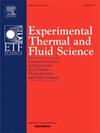Increased surface temperature at critical heat flux for single water droplet impact with alcohol additives
IF 2.8
2区 工程技术
Q2 ENGINEERING, MECHANICAL
Experimental Thermal and Fluid Science
Pub Date : 2025-01-17
DOI:10.1016/j.expthermflusci.2025.111413
引用次数: 0
Abstract
Elevating the critical heat flux limit during droplet impact cooling is advantageous for the thermal management of various high-power equipment. This study presents the experimental observation that the surface temperature at the critical heat flux point decreases with droplet impact velocity. The findings also demonstrate that low-carbon alcohol additives at small concentrations markedly increase the critical heat flux temperature of an impacting water droplet. In particular, the critical heat flux temperatures of dilute alcoholic solution droplets at higher impact velocities exceed those of pure water droplets at lower impact velocities within the present test range. Accordingly, low-carbon alcohol additives at low volume fractions can assure high heat transfer rates at large Weber numbers while also reducing the detrimental effect of impact velocity on the critical heat flux temperature. The significantly increased critical heat flux temperature associated with low-carbon alcohol additives is supposed to be considerably favorable for efficient heat dissipation of high-heat-flux electronic components.
增加了单水滴与酒精添加剂碰撞时的临界热流密度表面温度
提高液滴冲击冷却时的临界热流密度极限有利于各种大功率设备的热管理。本文通过实验观察,发现液滴在临界热通量点处的表面温度随着液滴撞击速度的增加而降低。研究结果还表明,低碳酒精添加剂在小浓度下显著提高了冲击水滴的临界热流密度温度。特别是在本试验范围内,高冲击速度下稀酒精溶液液滴的临界热流密度温度超过低冲击速度下纯水液滴的临界热流密度温度。因此,低体积分数的低碳醇添加剂可以保证在大韦伯数下的高传热率,同时也减少了冲击速度对临界热流密度温度的不利影响。低碳酒精添加剂显著提高了临界热流密度温度,这对高热流密度电子元件的高效散热是非常有利的。
本文章由计算机程序翻译,如有差异,请以英文原文为准。
求助全文
约1分钟内获得全文
求助全文
来源期刊

Experimental Thermal and Fluid Science
工程技术-工程:机械
CiteScore
6.70
自引率
3.10%
发文量
159
审稿时长
34 days
期刊介绍:
Experimental Thermal and Fluid Science provides a forum for research emphasizing experimental work that enhances fundamental understanding of heat transfer, thermodynamics, and fluid mechanics. In addition to the principal areas of research, the journal covers research results in related fields, including combined heat and mass transfer, flows with phase transition, micro- and nano-scale systems, multiphase flow, combustion, radiative transfer, porous media, cryogenics, turbulence, and novel experimental techniques.
 求助内容:
求助内容: 应助结果提醒方式:
应助结果提醒方式:


